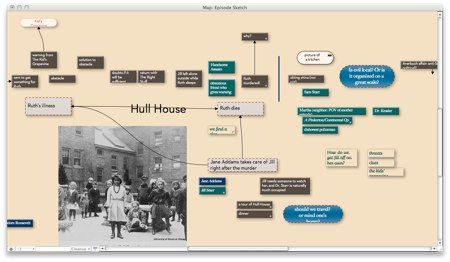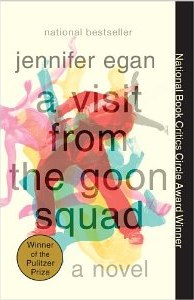For the Hypertext 2011 workshop on narrative, I've been thinking again about coherence. How hard is it for a hypertext narrative to stick together and make sense?
Bottom line: I think it's far easier than most of my colleagues do. I hope to show why.
One other group that worries about narrative coherence are social storytellers. One kind of social storytelling is the collaborative, episodic novel or screenplay, especially those where different writers build the story in turn.
Another example, of course, is the writer’s favorite drinking game, spinning a story that extends and exceeds what his neighbor has just said. See Michael Chabon’s Wonder Boys for many examples. It seems likely that the whole genre of vampire stories descends from one night of this, when Byron and the Shelleys had a good night of scaring each other in the Simplon Pass.
for many examples. It seems likely that the whole genre of vampire stories descends from one night of this, when Byron and the Shelleys had a good night of scaring each other in the Simplon Pass.
The development of role-playing games has inspired a number of new game-like entertainments that center on collaborative or social storytelling. These share some affinities with Dungeons and Dragons, but their focus is on creating good stories rather than on accumulating treasure or leveling up. In several, there’s no notion of “winning”, so perhaps these aren’t technically games. A number of narrativist games have been created by thoughtful and capable people who know a lot about narrative and its discontents, and others, less theoretically grounded, nevertheless seem to capture interesting ideas.
I’ve taken a brief look at a few of these games, and offer these notes as a starting point for interested colleagues. I have not studied these in detail, nor have I played them. Most are available in electronic form and can be downloaded for a modest charge.
Paul Czege
Who you are: a tortured minion in the service of the great and terrible Master.
What you seek: to serve the master, to please the Beloved, whom you adore, and upon whom the Master has terrible designs.
In the end: you, or one of the other minions, will grow to hate themselves so much that they will rise up and slay the master, ending their miserable existence.
Notable for: understanding that the point is not where we’re going – we know that – but how we get there. Well written and thoughtful.
Jason L. Blair
Who you are: a kid, between 8 and 12 years old.
What you seek: survival, in a world filled with monsters that wish you harm and which grownups cannot see. You know – the monsters in the closet, under your bed…
In the end: with the aid of your magic teddy bear, maybe you’ll live ’til dawn. And perhaps you can save your friends.
Notable for: terrific writing and imagination. The second edition apparently repairs my chief complaint, an unnecessary second layer of opponents. Closetland is scary enough.
Andrew Peregrine
Who you are: an orphan in a Victorian orphanage.
What you seek: doom (because it’s that kind of orphanage) and cookies.
In the end: terrible events happen, but pluck and courage might suffice.
Notable for: accessible and easy to start. Could be a nice scenario for Little Fears. Most of all, Peregrine understands how we need to complicate the story with “doom” and then more doom, but when the cookies are gone it’s time to find closure.
Robert Bohl
Who you are: a youthful offender, dedicated to resisting The Authority
What you seek: freedom, liberty, and a hell of a good time
In the end: you win some, you lose some, and you spray paint all the rest.
Notable for: dramatic arc with interesting reverses; wild typography.
D. Vincent Baker
Who you are: itinerant preachers and religious inquisitors in the American West, moving from town to town.
What you seek: to cast out sin, discord, and Satan.
In the end: not every soul can be saved. Your job is to save those you can, punish those you cannot, and move on to the next town.
Notable for: mechanics that reward dramatic escalation, and that generate stories with perplexing moral dimensions. Violence is possible, but seldom desirable. Extraordinarily fine and original world-building.
Jason Morningstar
Who you are: teenage Polish partisans during and after the 1944 Warsaw uprising
What you seek: it doesn't matter; this won't end well. But perhaps in the remaining time you can do some good, or find some moment of love or heroism.
In the end: martyrdom, nervous breakdown, depression, or derangement.
Notable for: problematizing everything. Mechanics feature a host of superb prompts that inspire and constrain scenes while retaining scope for new stories; these range from “Edmund Telakowski, dashing partisan and liar” to “lacy undergarments.” The emphasis on teen sexuality is likely to be awkward in a role-playing game but could work in storytelling.
Ryo Kamiya
Who you are: a maid in a Japanese cartoon
What you seek: to please your master, avoid punishment, perhaps to find fulfillment, and to get through the day without being dismissed
In the end: all sorts of insane, unexpected, and bizarre things keep happening, ranging from visiting TV crews to cursed dolls to costume malfunctions. Somehow, things work out.
Notable for: vast and zany tables of arbitrary events that complicate everything, from lecherous colleagues to runaway trains.
Robin D. Laws
Who you are: a caveman.
What you seek: dinner would be good. Not being dinner would be good, too.
In the end: find stuff. do things. hit them on head. learn stuff.
Notable for: instead of skills and spells, players have words. Not many. “You, me, sleep, cave, go, rock, water, bang” – words like that. Scientists have thus far discovered seventeen words. The GM can say anything, but players can only use their words. “When in doubt, say your few words louder. That always helps.”
Victor Gijsbers
Who you are: a minister or close companion of Joseph Stalin, 1928.
What you seek: Stalin is unhappy. He wants to hear a story. A good story. Please him. And, above all, say nothing about the food crisis.
In the end: many companions will be purged, exiled, shot, or will simply vanish. Perhaps you can arrange for Stalin to be displeased by someone else? Yes, that would be a plan.
Notable for: interesting card-based narrative mechanics, reminiscent of Card Shark and Auld Leakey.
Jason Morningstar
Who you are: a character. Quite a character, in fact.
What you seek: your friends will tell you when it’s time for you to know.
In the end: hilarity will ensue.
Notable for: complete focus on building and propelling narrative arc, without a game master and without pre-defining the plot or destination. Caper stories from Fargo to Band of Outsiders .



